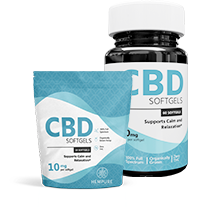CBD Oil for Sleep: Does CBD Oil Work and Should You Take It?
Sabina King on Jun 20th 2019
Lack of sleep plagues over 30% of the American population, with approximately 10 million people using prescription sleep aids.1 We are always looking for new research, techniques, and products to help us sleep better and feel more rested. Perhaps this is why the research into taking CBD oil for sleep is so exciting.
Lack of sleep isn’t just a nuisance -- it can be downright bad for health. One study found that 40% of people suffering from insomnia also experienced some type of psychiatric disorder.2 Sleep deprivation, or continual poor sleep has been linked to serious medical conditions, including heart disease, weakened immune system, diabetes, and diminished longevity.3 This is because sleep (and all its phases) is the time when our body undergoes muscle repair, memory consolidation, detoxification, and release of regulating hormones. A number of factors can cause poor sleep including stress and endocrine imbalances. Can CBD oil for sleep help with some of these?
CBD Oil to Help You Sleep
Stress can be a killer when it comes to sleep. In fact, more than half of Americans say they’ve lost sleep due to stress.4 So, for those who are missing out on valuable sleep due to their racing minds, CBD oil for sleep appears to hold some therapeutic promise.
A study published in the British Journal of Pharmacology found that CBD interacts with serotonin receptors in the brain.5 Serotonin participates in many biological processes. These include the mediation of stress, appetite, addiction, pain perception, nausea, and sleep.
A study that examined the ways in which serotonin impacts sleep discovered that stimulation of serotonin receptors could help in facilitating sleep.6 By interacting with the serotonin receptors in the brain, taking CBD for sleep can promote healthy and restful sleep.
CBD Oil and the Sleep Cycle
Our sleep cycle follows a pattern of alternating REM and NREM sleep.7 The majority of sleep is NREM (approximately 75%), which is essential for memory, hormone release, as well as cell production and repair.
The rest of sleep (25%) is REM -- eye movements become rapid, and the brain perks up, resembling the brain when it is awake. This is when your most vivid dreams occur. Sleepers also dream during NREM sleep, but these dreams tend to be more concept-based rather than the vivid and emotional REM dreams. The ill effects of REM sleep deprivation are less severe than NREM deprivation.

CBD oil has been shown to prolong the third phase of sleep in NREM.8 This stage, also known as N3, is where one receives the deepest and most restorative sleep, blood pressure drops, breathing slows, muscles become relaxed, blood supply to muscles increases, tissue growth and repair occurs, and hormones are released. This stage is key for restful and healthy sleep.

The Endocannabinoid System and Sleep
One of the main functions of CBD for sleep in the body is promoting a healthy and balanced endocannabinoid system (ECS). The endocannabinoid system permeates all of the other eleven unique systems in the body and helps direct their functions. For this reason, you will often hear the ECS referred to as a “meta-system”. It interacts with these systems while also governing them. While the nervous system enables communication throughout the body, the ECS aids in regulating almost every aspect of our wellbeing.
A study by PLOS discovered that regulating the endocannabinoid system improved the stability of NREM sleep.9 By activating the CB1 receptor, one of the main CB receptors in the endocannabinoid system, scientists increased sleep stability during NREM sleep. The same scientists also experimented with blocking CB1 receptors. Consequently, they discovered that NREM sleep was reduced and had more interruptions.
The body’s own endocannabinoids are responsible for binding to and stimulating the CB1 receptors found throughout the body. Since CBD can increase the availability of your body’s own cannabinoids, it stands to reason that CBD could encourage the ability of your endocannabinoid system to stabilize sleep.
Increasing The Amount of Sleep With CBD
Ever feel like you aren’t getting enough sleep? A study carried out by the University of Sao Paolo discovered that CBD oil increased the amount of sleep time in rats.10 Compared to placebo groups, rats that received CBD slept longer and also experienced greater amounts of REM sleep during the night. While much of the research into CBD and sleep is still in its infancy, studies like these indicate CBD shows enormous promise in supporting healthy sleep. If you plan to start taking CBD for sleep, you might have some more questions.
How long before CBD oil will improve your sleep?
Everyone’s bodies and endocannabinoid systems are unique, which is why there is no standard period after which you will feel guaranteed effects. Some people find that they sleep better the very first night that they take CBD, while others take weeks. Experiment until you find what works for you, and don’t give up if you find that CBD for sleep isn’t a quick-fix product. Some guidelines for ‘experimenting’ might ensure you feel the effects of CBD faster:
Start with a low dose
If you’ve never taken CBD before, introduce it to your system with a lower dose instead of flooding your system with it. Generally speaking, if you don’t feel any improvements in your sleep after a week, you can go ahead and increase your dose. Repeat the process as needed until you feel effects.
Be consistent
Don’t skip days when taking CBD for sleep, especially in the early stages. Every dose provides support to the endocannabinoid system to help you get the rest you want. Consistency is especially important while you figure out what dose is best for you.
Pay attention to yourself
Keep track of any differences you feel in your body and mind to know whether to increase or decrease your dosage.
Play around with schedules
Some might benefit from taking one dose in the morning or evening, while others might get better results from micro dosing through the day. Find what works for you!
Does CBD Oil Make You Sleepy?
One thing people worry about when starting a new sleep aid is daytime drowsiness. If you take CBD with THC you may, in fact, feel sleepy at times when you don't want to go to sleep. But with zero THC CBD, you don't have to worry: even though it makes you sleep better, it won't make you sleepy in the middle of the day. Another good thing about THC-free CBD is that there are no psychoactive effects.
CBD Oil and Daytime Wakefulness
Unlike prescription sleep aids, taking CBD for sleep does not appear to induce sleepiness during the day, but rather helps promote a healthy sleep cycle. One study discovered that CBD worked as a wakefulness agent, meaning that it could actually help people that felt sleepy during the day to feel more alert and awake.11
Although many people take CBD oil for sleep, it also appears to encourage alertness during the day.
How Long Will the Effects of CBD Oil Last?
The answer to this question depends on two things: the dosage and the delivery system. When looking at dosage, also consider the strength of CBD - you can find this by checking the label. Drops and softgels tend to last for longer, making them the most common choice for a better night's sleep.
When to Take CBD Oil to Help You Sleep
Most people who take CBD oil for sleep take it one hour before bedtime. This allows time to unwind and for your body to process it. This will help you fall asleep and stay asleep throughout the night.
Benefits of CBD Oil for Sleep
There are several reasons why more people are turning to CBD for sleep aid:
Benefits over pharmaceuticals
Over the counter and prescription pharmaceutical sleep aids come with several side effects. Benzodiazepines commonly prescribed for insomnia can cause daytime sleepiness, dizziness and even depression. But even more worrying is the fact that they are often misused for recreational purposes, an occurrence that sends tens of thousands of people to the hospital every year. They can be addictive over time, and cause withdrawal after stopping use. There is no evidence that CBD is habit forming, and due to its non-psychoactive nature, it’s not likely to be misused.
The source of sleeplessness
Another benefit to healthy serotonin levels is stress reduction. Many insomniacs may find that their situation is caused by the inability to control obsessive thoughts when trying to sleep. If CBD can interact with serotonin receptors, that could be the reason that chronic worriers get relief from taking it. As opposed to traditional sleep aids, CBD can get right to the source of sleeplessness.
Sleep only when needed
As mentioned earlier, one of the biggest benefits to CBD is its purported role in daytime alertness, which is a boon to those that have tried traditional sleep aids. One needn’t worry about going through the day like a zombie while taking CBD for sleep.
CBD Oil And Sleep: Concluding Thoughts
The research shows CBD interacts with our sleep cycles in a complex way that includes mitigating stress, prolonging essential NREM sleep cycles, and stabilizing sleep patterns. For the 10 million Americans that are affected by lack of restful sleep, CBD oil can provide benefits to your sleep cycle.
Have more questions about introducing CBD into your life? Find the answers, latest research, and science in the Intro To CBD Textbook and CBD Crash Course where you can learn how CBD interacts with the body in detail.
Bibliography
- Julie Sowder. Insomnia Statistics, Better Sleep Guide, 2018, https://www.better-sleep-better-life.com/insomnia...
- Thomas Roth. Insomnia:Definition, Prevalence, Etiology, and Consequences, Journal of Clinical Sleep Medicine, 2007 Aug 15, https://www.ncbi.nlm.nih.gov/pmc/articles/PMC1978...
- Rachel Nall. How Does Seven To Eight Hours of Sleep Affect Your Body?, Healthline, 2016 Oct 16, https://www.healthline.com/health/science-sleep-w...
- Julie Sowder. Insomnia Statistics, Better Sleep Guide, 2018, https://www.better-sleep-better-life.com/insomnia...
- Leonardo Resstel, RodrigoTavares, Sabrina Lisboa, Samia Joca, Fernando Correa, Francisco Guimaraes. 5-HT1A Receptors are involved in the cannabidiol-induced attenuation of behavioral and cardiovascular responses to acute restraint stress in rats, British Journal of Pharmacology, 2009 Jan, https://www.ncbi.nlm.nih.gov/pmc/articles/PMC2697...
- Reidun Ursin. Serotonin and sleep, Sleep Medicine Reviews, 2002, https://pdfs.semanticscholar.org/c2fb/651aca435df...
- Jodie Tyley. What Happens toYour Body When You Sleep?, Independent, 2015 Oct 1, https://www.independent.co.uk/life-style/health-a...
- Marcos Chagas, Jose Crippa, Antonio Zuardi. Effects of acute systemic administration of cannabidiol on sleep-wake cycle in rats, Journal of Psychopharmacology, 2013 Jan 23. http://journals.sagepub.com/doi/abs/10.1177/02698...
- Matthew Pava, Alexandros Makriyannis, David Lovinger. Endocannabinoid Signalling Regulates Sleep Stability, PloS One, 2016 Mar 31, https://www.ncbi.nlm.nih.gov/pmc/articles/PMC4816...
- Marcos Chagas, Jose Crippa, Antonio Zuardi. Effects of acute systemic administration of cannabidiol on sleep-wake cycle in rats, Journal of Psychopharmacology, 2013 Jan 23, http://journals.sagepub.com/doi/abs/10.1177/02698...
- Eric Rodriguez, Andrea Sarro-Ramirez, Daniel Sanchez, Stephanie Mijangos-Moreno, Alma Tejeda-Padron, Alwin Poot-Ake, Khalil Guzman, Edla Pacheco-Pantoja, Oscar Arias-Carrion. Potential Effects of Cannabidiol as a Wake-Promoting Agent, Current Neuropharmacology, 2014 May, https://www.ncbi.nlm.nih.gov/pmc/articles/PMC4023...

















